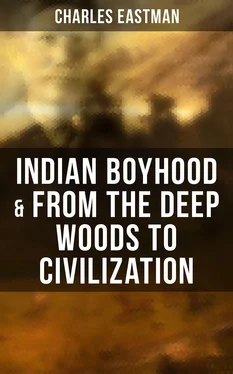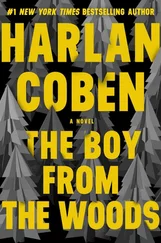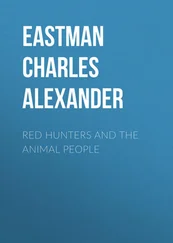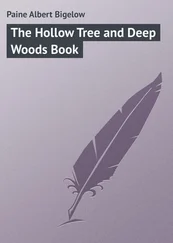Charles Eastman
Indian Boyhood & From the Deep Woods to Civilization
Published by

Books
- Advanced Digital Solutions & High-Quality eBook Formatting -
musaicumbooks@okpublishing.info
2018 OK Publishing
ISBN 978-80-272-4525-3
Indian Boyhood Indian Boyhood Table of Contents
From the Deep Woods to Civilization
Table of Contents Table of Contents Indian Boyhood Indian Boyhood Table of Contents From the Deep Woods to Civilization
Table of Contents Table of Contents Indian Boyhood Indian Boyhood Table of Contents From the Deep Woods to Civilization
I. Earliest Recollections I. Earliest Recollections Table of Contents
I. Hadakah, “The Pitiful Last”
II. Early Hardships
III. My Indian Grandmother
IV. An Indian Sugar Camp
V. A Midsummer Feast
II. An Indian Boy’s Training
III. My Plays and Playmates
I. Games and Sports
II. My Playmates
III. The Boy Hunter
IV. Hakadah’s First Offering
V. Family Traditions
I. A Visit to Smoky Day
II. The Stone Boy
VI. Evening in the Lodge
I. Evening in the Lodge
II. Adventures of My Uncle
VII. The End of the Bear Dance
VIII. The Maidens’ Feast
IX. More Legends
I. A Legend of Devil’s Lake
II. Manitoshaw’s Hunting
X. Indian Life and Adventure
I. Life in the Woods
II. A Winter Camp
III. Wild Harvests
IV. A Meeting on the Plains
V. An Adventurous Journey
XI. The Laughing Philosopher
XII. First Impressions of Civilization
I. Earliest Recollections
Table of Contents
I. Hadakah, “The Pitiful Last”
Table of Contents
What boy would not be an Indian for a while when he thinks of the freest life in the world? This life was mine. Every day there was a real hunt. There was real game. Occasionally there was a medicine dance away off in the woods where no one could disturb us, in which the boys impersonated their elders, Brave Bull, Standing Elk, High Hawk, Medicine Bear, and the rest. They painted and imitated their fathers and grandfathers to the minutest detail, and accurately too, because they had seen the real thing all their lives.
We were not only good mimics but we were close students of nature. We studied the habits of animals just as you study your books. We watched the men of our people and represented them in our play; then learned to emulate them in our lives.
No people have a better use of their five senses than the children of the wilderness. We could smell as well as hear and see. We could feel and taste as well as we could see and hear. Nowhere has the memory been more fully developed than in the wild life, and I can still see wherein I owe much to my early training.
Of course I myself do not remember when I first saw the day, but my brothers have often recalled the event with much mirth; for it was a custom of the Sioux that when a boy was born his brother must plunge into the water, or roll in the snow naked if it was winter time; and if he was not big enough to do either of these himself, water was thrown on him. If the new-born had a sister, she must be immersed. The idea was that a warrior had come to camp, and the other children must display some act of hardihood.
I was so unfortunate as to be the youngest of five children who, soon after I was born, were left motherless. I had to bear the humiliating name “Hakadah,” meaning “the pitiful last,” until I should earn a more dignified and appropriate name. I was regarded as little more than a plaything by the rest of the children.
My mother, who was known as the handsomest woman of all the Spirit Lake and Leaf Dweller Sioux, was dangerously ill, and one of the medicine men who attended her said: “Another medicine man has come into existence, but the mother must die. Therefore let him bear the name ‘Mysterious Medicine.’” But one of the bystanders hastily interfered, saying that an uncle of the child already bore that name, so, for the time, I was only “Hakadah.”
My beautiful mother, sometimes called the “Demi-Goddess” of the Sioux, who tradition says had every feature of a Caucasian descent with the exception of her luxuriant black hair and deep black eyes, held me tightly to her bosom upon her death-bed, while she whispered a few words to her mother-in-law. She said: “I give you this boy for your own. I cannot trust my own mother with him; she will neglect him and he will surely die.”
The woman to whom these words were spoken was below the average in stature, remarkably active for her age (she was then fully sixty), and possessed of as much goodness as intelligence. My mother’s judgment concerning her own mother was well founded, for soon after her death that old lady appeared, and declared that Hakadah was too young to live without a mother. She offered to keep me until I died, and then she would put me in my mother’s grave. Of course my other grandmother denounced the suggestion as a very wicked one, and refused to give me up.
The babe was done up as usual in a movable cradle made from an oak board two and a half feet long and one and a half feet wide. On one side of it was nailed with brass-headed tacks the richly-embroidered sack, which was open in front and laced up and down with buckskin strings. Over the arms of the infant was a wooden bow, the ends of which were firmly attached to the board, so that if the cradle should fall the child’s head and face would be protected. On this bow were hung curious playthings—strings of artistically carved bones and hoofs of deer, which rattled when the little hands moved them.
In this upright cradle I lived, played and slept the greater part of the time during the first few months of my life. Whether I was made to lean against a lodge pole or was suspended from a bough of a tree, while my grandmother cut wood, or whether I was carried on her back, or conveniently balanced by another child in a similar cradle hung on the opposite side of a pony, I was still in my oaken bed.
This grandmother, who had already lived through sixty years of hardships, was a wonder to the young maidens of the tribe. She showed no less enthusiasm over Hakadah than she had done when she held her first-born, the boy’s father, in her arms. Every little attention that is due to a loved child she performed with much skill and devotion. She made all my scanty garments and my tiny moccasins with a great deal of taste. It was said by all that I could not have had more attention had my mother been living.
Uncheedah (grandmother) was a great singer. Sometimes, when Hakadah wakened too early in the morning, she would sing to him something like the following lullaby:
Sleep, sleep, my boy, the Chippewas
Are far away—are far away.
Sleep, sleep, my boy; prepare to meet
The foe by day—the foe by day!
The cowards will not dare to fight
Till morning break—till morning break.
Sleep, sleep, my child, while still ‘tis night;
Then bravely wake—then bravely wake!
The Dakota women were wont to cut and bring their fuel from the woods and, in fact, to perform most of the drudgery of the camp. This of necessity fell to their lot, because the men must follow the game during the day. Very often my grandmother carried me with her on these excursions; and while she worked it was her habit to suspend me from a wild grape vine or a springy bough, so that the least breeze would swing the cradle to and fro.
Читать дальше













